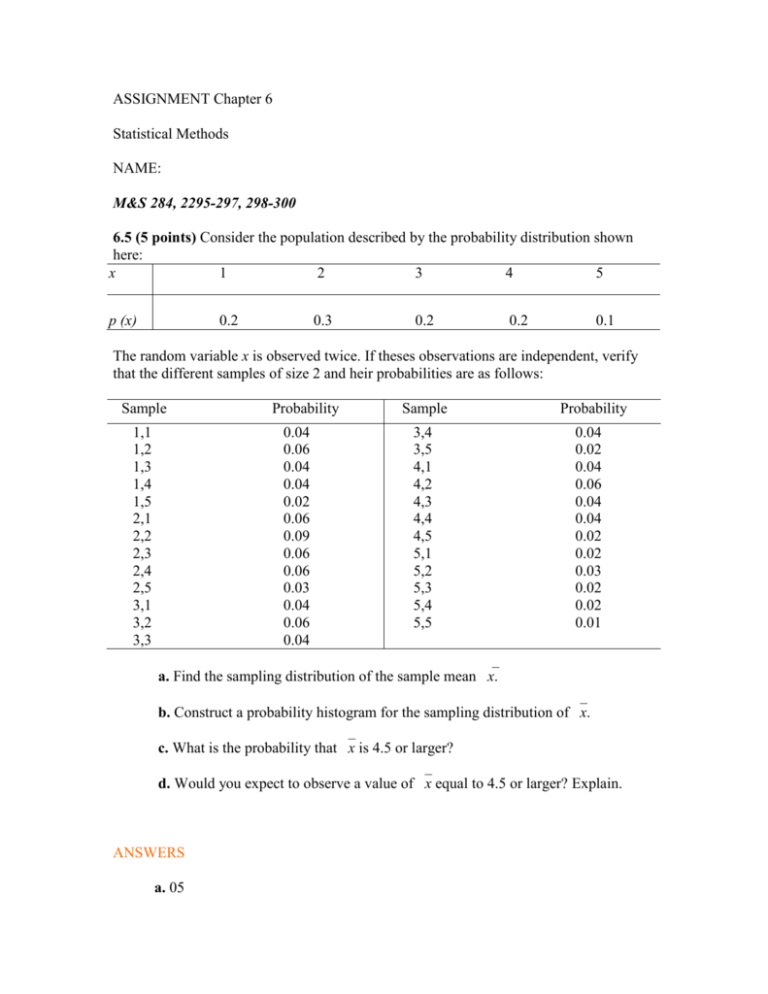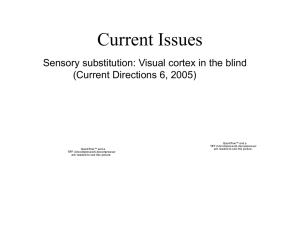chapter62601answers
advertisement

ASSIGNMENT Chapter 6 Statistical Methods NAME: M&S 284, 2295-297, 298-300 6.5 (5 points) Consider the population described by the probability distribution shown here: x 1 2 3 4 5 p (x) 0.2 0.3 0.2 0.2 0.1 The random variable x is observed twice. If theses observations are independent, verify that the different samples of size 2 and heir probabilities are as follows: Sample 1,1 1,2 1,3 1,4 1,5 2,1 2,2 2,3 2,4 2,5 3,1 3,2 3,3 Probability 0.04 0.06 0.04 0.04 0.02 0.06 0.09 0.06 0.06 0.03 0.04 0.06 0.04 Sample 3,4 3,5 4,1 4,2 4,3 4,4 4,5 5,1 5,2 5,3 5,4 5,5 Probability 0.04 0.02 0.04 0.06 0.04 0.04 0.02 0.02 0.03 0.02 0.02 0.01 a. Find the sampling distribution of the sample mean x. b. Construct a probability histogram for the sampling distribution of x. c. What is the probability that x is 4.5 or larger? d. Would you expect to observe a value of x equal to 4.5 or larger? Explain. ANSWERS a. 05 d. no 6.14 (5 points) Consider the following probability distribution: x 0 p(x) 1/ 3 1 1/ 3 4 1/ 3 a. Find and 2. b. Find the sampling distribution of the sample mean x for a random sample of n = 2 measurements from this distribution. c. Show that x is an unbiased estimator of [Hint: Show that E (x) = x p(x)=.] d. Find the sampling distribution of the sample variance s2 for a random sample of n = 2 measurements form this distribution. e. Show that s2 is an unbiased estimator for 2. ANSWERS QuickTime™ and a TIFF (Uncompressed) decompressor are needed to see this picture. QuickTime™ and a TIFF (Uncompressed) decompressor are needed to see this picture. 6.27 (6 points) Suppose a random sample of n measurements is selected from a population with mean = 100 and variance 2 = 100. Fir each of the following values of n, give the mean and standard deviation of the sampling distribution of the sample mean x: a. n = 4 b. n = 25 c. n = 100 d. n = 50 e. n = 500 f. n = 1,000 ANSWERS a. = 100, = 5 b. = 100, = 2 c. = 100, = 1 d. = 100, = 5 e. = 100, = 5 f. = 100, = .316 6.32 (4 points) A random sample of n = 900 observations is selected from a population with = 100 and = 10. a. What are the largest and smallest values of x that you would expect to see? b. How far, at the most, would you expect x to deviate from ? c. Did you have to know to answer part b? Explain. ANSWERS QuickTime™ and a TIFF (Uncompressed) decompressor are needed to see this picture. 6.36(3 points) Research on eating disorders. Refer to The American Statistician (May 2001) study of female students who suffer from bulimia, presented in Exercise 2.38 (p. 48). Recall that each student completed a questionnaire from which a “feat of negative evaluation” (FNE) score was produced. (The higher the score, the greater is the hear of negative evaluation.) Suppose the FNE scores of bulimic students have a distribution with mean = 18 and standard deviation = 5. Now, consider a random sample of 45 female students with bulimia. a. What is the probability that the sample mean FNE score is greater then 17.5? b. What is the probability that the sample mean FNE score is between 18 and 18.5? c. What is the probability that the sample mean FNE score is less than 18.5? ANSWERS QuickTime™ and a TIFF (Uncompressed) decompressor are needed to see this picture. 6.38 (1point) Improving SAT scores. Refer to the Chance (Winter 2001) examination of SAT scores of students who pay a private tutor to help them improve their results, presented in Exercise 2.101 (p.74). On the SAT-Mathematics test, these students had a mean change in score of +19 points, with a standard deviation of 65 points. In a random sample of 100 students who pay a private tutor to help them improve their results, what is the likelihood that the change in the sample mean score is less than 10 points? ANSWER QuickTime™ and a TIFF (Uncompressed) decompressor are needed to see this picture. 6.41(3 points) levelness of concrete slabs. Geotechnical engineers use water-level “manometer” surveys to assess the levelness of newly constructed concrete slabs. Elevations are typically measured at eight points on the slab; of interest is the maximum differential between elevations. The Journal of Performance of Constructed Facilities (Feb. 2005) published an article on the levelness of slabs in California residential developments. Elevation data collected on over 1,300 concrete slabs before tensioning revealed that the maximum differential x has a mean of = .53 inch and a standard deviation of = .193 inch. Consider a sample of n = 50 slabs selected from those surveyed, and let x represent the mean of the sample. a. Describe fully the sampling distribution of x. b. Find P( x > .58). c. The study also revealed that the mean maximum differential of concrete slabs measured after tensioning and loading is = .58 inch. Suppose the sample data yield x = .59 inch. Comment on whether the sample measurements were obtained before tensioning or after tensioning and loading. ANSWERS a. x = .53, x = .0273, approx. normal b. .0336 c. after 6.60 (5 points) Violence and stress. Interpersonal violence (e.g., rape) generally leads to psychological stress for the victim. Clinical Psychology Review (Vol. 15, 1995) reported on the results of all recently published studies of the relationship between interpersonal violence and psychological stress. The distribution of the elapsed between the violent incident and the initial sign of stress has a mean of 5.1years and a standard deviation of 6.1 years. Consider a random sample of n = 150 victims of interpersonal violence. Let x represent the mean time elapsed between the violent act and the first sign of stress for the sampled victims. a. Given the mean and standard deviation of the sampling distribution of x. b. Will the sampling distribution of x be approximately normal? Explain. c. Find P (x > 5.5). d. Find P (4 < x < 5). ANSWERS QuickTime™ and a TIFF (Uncompressed) decompressor are needed to see this picture. 6.65 (2 points) New method of teaching arithmetic. This past year, an elementary school began using a new method to teach arithmetic to first graders. A standardized test, administered at the end of the year, was used to measure the effectiveness of the new method. The distribution of past scores on the standardized test produced a mean of 75 and a standard deviation of 10. a. If the new method is no different from the old method, what is the approximate probability that the mean score x of a random sample of 36 students will be greater than 79? b. What assumptions must be satisfied to make your answer valid? ANSWERS a. 008 b. n large 6.66 (2 points) Supercooling temperature of frogs. Many species of terrestrial tree frogs that hibernate at or neat the ground surface can survive prolonged exposure to low winter temperatures. In freezing conditions, the frog’s body temperature, called its supercooling temperature, remains relatively higher because of an accumulation of glycerol in its body fluids. A study in Science revealed that the supercooling temperature of terrestrial frogs frozen at -6oC has a relative frequency distribution with a mean of 2oC and ta standard deviation of 0.3oC. Consider the mean supercooling temperature x of a random sample of n = 42 terrestrial frogs frozen at -6oC. a. Find the probability that x exceeds -2.05oC. b. Find the probability that x falls between -2.20oC and -2.10oC. ANSWERS QuickTime™ and a TIFF (Uncompressed) decompressor are needed to see this picture. Total points: 36






